Migrants go north. The specifics of the migration situation in Scandinavia
Sweden - a policy favored by migrants
Sweden has always been one of the most tolerant countries to migrants. Back in 1930-s. in Sweden, the construction of a “welfare state” began, the basic principles of which proclaimed social peace and the consolidation of the efforts of all the inhabitants of the country in order to enhance the well-being and welfare of the population. The notorious “Swedish socialism”, which was spoken about so much in the 1980-1990-s, being a very good and viable model of the country's development, in the changed political conditions, especially considering the transnational background of the changes, caused many of the country's problems. Among them, the migration problem is far from the last. Back in the middle of the twentieth century. The Swedish government has embarked on an extremely loyal attitude towards foreign migrants, based on the desire to integrate them into Swedish society on equal terms. In fact, every foreign migrant has equal rights with Swedish citizens, except for the right to vote in parliamentary elections.
From about the second half of the twentieth century. in the Scandinavian countries, there is a rapid aging of the population. This is a consequence of a general decline in the birth rate, an increase in the age of marriage, the spread of a childless family model and non-traditional sexual relations. The age of employees in the Scandinavian countries is constantly rising, while even increasing life expectancy and raising the retirement age are not able to solve the problem of reducing the labor force of the country. The paradox of the situation is that, right up to the end of the First World War, Sweden was not a host country, but a donor country of migration. Since the economic situation in Sweden before the beginning of the twentieth century. It was not prosperous, a significant number of Swedes chose to emigrate from the country. The main migration flows from Sweden went to the United States and Canada. Outflow of the population became the most serious problem of Swedish society at the beginning of the 20th century. - at least 1 / 5 parts of the population left the country. Mostly Swedish peasants emigrated, which had an even greater effect on the birth rate - after all, in cities it was traditionally lower. After the First World War, the outflow of population from Sweden gradually stopped, and from the middle of the XX century. the country itself has become a host state. In 2008 was up to 13,5% of Swedish residents were born outside the country, and 22% of the population were either immigrants or descendants of immigrants in the second and third generations. And if initially immigrants from Denmark, Norway and Finland, which were less prosperous at that time, were sent to Sweden, which practically did not carry serious sociocultural contradictions, then from the second half of the 20th century. The influx of immigrants from Southern and Eastern Europe — Portugal, Greece, Poland, and then from African and Asian countries — has intensified. Currently, the most numerous group of foreign migrants in Sweden are people from neighboring Finland who easily integrate into Swedish society. However, one should not think that the Finns make up the majority of immigrants. Collectively, a much larger number of foreign migrants residing in Sweden are represented by people from numerous countries in Africa, Asia and Southern Europe. First of all, these are Albanians and Bosnians, Iraqis, Iranians, Turks, Somalis, Eritreans. It is the African and Asian immigrants who demonstrate the greatest cultural differences from the indigenous people of Sweden, which entails many problems and contributes to the increase of the general social and political tensions in the country. A significant part of immigrants and Asian and African countries were able to quickly adapt to the living conditions in Swedish society, occupying vacant niches in the economy. So, immigrants are very active in such areas as the sale of food and clothing, consumer services, housing and communal services, hotel business, clothing, leather and food industries. At the same time, given the specifics of the migrant environment, one can hardly hope that at the expense of immigrants it will be possible to cover the shortage of highly qualified specialists in such areas of the economy as information technology, metallurgy, engineering, innovative and high-precision manufacturing, and health care.
The first problem associated with migration is the overall change in the “social face” of modern Sweden. The current Swedish population is no longer homogeneous - the citizens of the country have very different, sometimes - very exotic origins. Since a significant part of immigrants prefer not to work, but live on social benefits, or fill the niche of hard and unskilled labor, the overall social welfare of the Swedish population is changing. The share of lumpen and marginal layers in the total population of the country is increasing. The second problem related to migration is the increasing segregation of Swedish society. Both Swedes and many immigrants strive for maximum distancing from each other, which is associated with numerous stereotypes and prejudices that exist in the Swedish and in the immigrant environment. A significant part of immigrants, arriving in Sweden, does not seek to assimilate and even integrate into the host society. On the contrary, migrants are beginning to build "mini-Somalia," mini-Syria "," mini-Iraqi ", transforming low-prestigious areas of Swedish cities into conglomerates of colorful ethnic enclaves. The desire for isolation, in turn, promotes mutual misunderstanding of immigrants from African and Asian countries and the indigenous people of Sweden. Moreover, enclavization inevitably leads to such negative consequences as the growth of ethnic crime, the spread of religious and political extremism, and from both sides. Extremist religious sentiments are spreading among certain groups of migrants, nationalist slogans are increasingly heard among the indigenous population. Entire generations of migrants from Asia and Africa are unable or unwilling to find work, they are marginalized, they are embarking on the path of criminal activity. Given the conditions of detention in Swedish prisons, many migrants, especially from marginal groups, are not afraid of criminal punishment. The increased criminalization and isolation of migrants contribute to the emergence of xenophobic attitudes among the Swedish population, which in the most aggressive part of Swedish youth take the form of national extremist behavior. Considering that among migrants, in turn, the proportion of young men is extremely high, and the aggression is very high, migrants also often act as subjects of mass riots on the streets of Swedish cities.
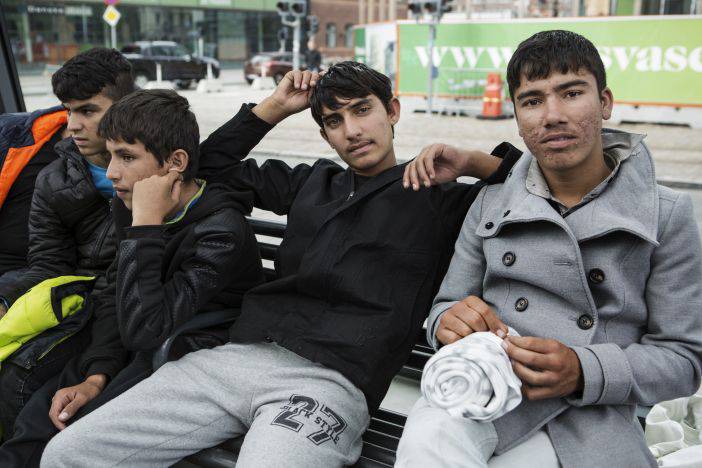
Meanwhile, a full-fledged social state is possible only if there is no mass unemployment in the country. At least 80% of the adult population of the country should have a full-fledged job, so that you can talk about a social state and social justice. Indeed, among Swedes, 84% of the adult population has a permanent job. But the number of working migrants does not reach and 50% - the majority of migrants from Asian and African countries do not work. It turns out that working Swedes are forced to keep arriving foreigners on their taxes, who receive social benefits. The second negative point is statistical data indicating the predisposition of the migrant environment to marginal forms of behavior. According to researchers, the majority of criminals convicted by the Swedish courts for committing serious crimes are foreign migrants. In Swedish schools, the majority of under-performing children are also represented by migrant children. Unfortunately, it is almost impossible to change this situation, especially since these indicators are based on objective reasons - poorly speaking or not fluent in Swedish children of migrants are doomed to poor performance, and migrants themselves, who have completely different values and notions about life than the Swedish population, Do not seek employment. And if you want, it’s not so easy for them to find jobs, especially given the lack of the necessary education, professional qualifications and also lack of knowledge or extremely poor knowledge of Swedish.
For a long time, Sweden adhered to a very liberal migration policy, accepting both labor migrants and refugees and forced migrants from the Third World countries. However, this policy has led to a number of the above problems. But the state is not going to abandon the overall multiculturalist strategy that Sweden is guided by in its national and migration policies over the past decades. Currently, the birth rate in Sweden has increased significantly, due to the presence in the territory of the country of significant number of migrant groups from Africa and the Middle East. According to the researchers, within one or two, maximum three generations, ethnic Swedes may become a national minority in Sweden. It turns out that in the country there is a gradual replacement of the population. Awareness of this unfortunate perspective contributes to the gradual “recovery” of a significant part of Swedish voters. In the opinion of the Swedish right, the approach of the authorities of Sweden and most of the Western European countries as a whole is fundamentally wrong. Instead of helping to create normal living conditions in Africa and Asia, European governments encourage migration to an already crowded Europe, the climate and natural resources of which are objectively worse than in the same warm countries of Africa and the Middle East. Mass migration from the countries of the “third world” to the developed European countries will never solve the main reason for the migration itself - terrible poverty in African and Asian countries. The Swedish right believes that the country's political elite, connected with transnational political and economic circles, do not protect the interests of the Swedish population and put them on the map in the name of very dark social experiments. The consequences of these social experiments are the bloody wars unleashed in Asian and African countries, the exodus of the Third World population from wars, revolutions and economic backwardness to Europe, the spread of extremist movements in migrant diasporas. Transnational elites want to form non-national amorphous communities, devoid of national identity and cultural identity, which would represent the ideal "slaves" and "consumers". In this case, the excessive liberalism of the Swedish and other European governments in relation to the mass migration to the territory of Sweden from African and Asian countries is quite understandable.
With the beginning of the mass arrival in Europe of refugees from the belligerent countries of North Africa and the Middle East and the so-called "refugees" - migrants from peaceful but underdeveloped states trying to pass themselves off as refugees, an even greater number of foreigners began to enter Sweden. Asylum seekers in Sweden, whose population is 10 million, have already been contacted by at least 80 thousands of refugees. Most of them are well aware that Sweden, in fact, is a “paradise for migrants” - there is a very liberal migration policy, high social benefits, and government agencies are focused on protecting the rights of migrants than on the rights of the indigenous population. But gradually and the Swedish authorities are beginning to realize the danger of the current situation - not only for the political and socio-cultural sphere of Swedish society, but also for the labor market. For example, the Minister for Migration Affairs of Sweden, Morgan Johansson, stressed that at present all European countries need to make joint efforts to accommodate refugees from African and Middle Eastern countries.
Most of the foreign migrants have been living in Sweden for more than 10 years, 60% of them are citizens of the country and, accordingly, will not leave anywhere, because they have the full right to live in their new country. In Sweden, there is a practice of granting citizenship after five years of residence in the country. Critics of mass migration offer their own recipes for solving this problem. Thus, according to the Swedish right, it is necessary to immediately “close the doors” and stop the experiment that has been going on for decades, turning Sweden into a multicultural state. The next step should be the development and implementation of a program for the repatriation of foreign migrants. For example, you can use a fairly common practice of paying compensation to immigrants, subject to their departure from the country. Presumably, the Swedish government will be able to offer half a million foreign migrants monetary assistance in the amount of 200 000 crowns per person. According to the Swedish right, this decision will not only improve the situation in Sweden itself and ease tensions in Swedish society, but also help migrants themselves who return home with fabulous money by the standards of their home countries. Speaking about repatriation, right-wing nationalists have in mind, above all, the repatriation of people from Muslim countries in North Africa and the Middle East, who today constitute over 6% of the population of Sweden and are the group of the population with the highest birth rate. This category of migrants is characterized by the greatest tendency to segregation and the formation of ethnic enclaves, the least adaptability to living conditions in Swedish society, the absence of a pronounced desire for integration and the adoption of lifestyles and values and ideological attitudes of the majority of the population of the host state. The migration discourse was most active after the notorious events in Cologne, Germany. As it turned out, sex crime in Sweden, as in other Scandinavian countries, is largely due to the presence of a large number of migrants and refugees. A modern average migrant from Africa or the Near and Middle East - a young man 18-40 years, as a rule - not burdened with education, professional qualifications and almost no idea about living conditions in the host society, culture, lifestyle, values and behaviors of the Scandinavian population.
Norway: multiculturalism, Norwegian cultural code and migrants
Neighboring Norway is also one of the countries where a large number of foreign migrants and refugees flock to. Initially, Norway, like Sweden, was practically a mono-ethnic state. Until the middle of the 1970-ies. foreign migration to Norway was virtually absent, but the Norwegians themselves, like the Swedes, migrated to the United States and Canada. The groups of foreigners living on the territory of the country — the Finns, the Norwegians, the Danes — were not distinguished by their culture and way of life from the bulk of the Norwegian population. The situation began to change at the end of the twentieth century. Already by 2002 The number of immigrants in the total structure of the Norwegian population was 6,9% of the country's population. According to Norwegian statistics, immigrants are people born outside of Norway, or children of people born outside of Norway. With a small population, Norway’s social and economic situation remains extremely good - the country receives high incomes from oil and gas production in the North Sea, which allows it to maintain the Norwegian model of a “welfare state”. In Norway - one of the highest in the world living standards of the population, a very high life expectancy. But, as in Sweden, one of the main problems of the Norwegian state is the gradual aging of the population. The high life expectancy, combined with low birth rates, has the effect of gradually “pensioning” the Norwegian population. But someone needs to replace aging Norwegian workers? It was precisely to solve the country's demographic problems that Norway once opened its doors to foreign labor migrants. The pseudo-humanistic position of the Norwegian government contributed to the fact that in Norway from the 1990-s. Thousands of refugees are being sent from virtually all the hot spots of the planet. Here foreign refugees find not only shelter, but also very high social benefits. Why can the policy of the Norwegian government be called pseudo-humanistic? Yes, because Norway is a member of NATO, a longtime strategic ally of the United States and, therefore, an accomplice in numerous war crimes of the American government against the peoples of Yugoslavia, Iraq, Libya, Syria and a number of other states. But, instead of displaying genuine humanism and protesting against the aggressive US policy, promoting peace on earth, the Norwegian government is not outraged by the bombings of Asian and African states, but is ready to accept people fleeing from the US wars. The first numerous wave of refugees rushed to Norway in 1994. from the territory of the former Yugoslavia, where then there was a bloody war between the Serbs and Croats, the Serbs and the Bosnians, the Serbs and the Albanians. The consequence of the war in the Balkans was the arrival in Norway of 11 thousands of Bosnian refugees. For the five millionth Norwegian - not so small figure. Then refugees from Iraq, Afghanistan, Somalia, Syria began to arrive in Norway.
Gradually, the presence of a large number of people brought up in a completely different culture and unaware of the rules of behavior in Norwegian and in general European society turned into a very big problem for Norway. Her quite defiantly and vividly marked the notorious Andreas Breivik. As is known, he was an ardent opponent of migration, a supporter of right-wing views, but preferred to act as an individual terrorist in the early twentieth century. The shooting of eighty people guaranteed him worldwide fame, drew attention to the problems of migration in Norway and in Europe as a whole, but at the same time discredited the nationalist movement, forcing him to dissociate himself from Breivik's action. Of course, Breivik, as an extraordinary person, would bring much more benefit to his country, if he did not take the path of crime, he would turn his activity and determination into the plane of political activity — even parliamentary, or even extra-parliamentary. But among the part of the Norwegians, Breivik’s deed found at least an understanding. The fact is that there are two acute problems in the country - the cultural incompatibility of migrants and the indigenous population and the heightened criminalization of the migrant environment. The second problem, by and large, stems from the first. Much of the migrants, especially those arriving from Africa and the countries of the Middle East, do not intend to integrate into Norwegian society. Moreover, migrants in every possible way show contempt for local customs, norms of behavior, local population. Police in the Norwegian capital Oslo admits that the majority of rapes and other sexual crimes are committed by migrants. In areas where migrants begin to account for 30% of the population and more, there is an outflow of the Norwegian population. Currently, only immigrants from the Muslim countries of the Middle East and Africa in Oslo constitute at least 10% of the population. Up to half of them do not speak Norwegian at all, which also affects the prospects for their employment. As in Sweden, many migrants do not work, and prefer to live on benefits or criminal income. An even more serious danger to Norwegian society is the spread of extremist religious views among migrants. Among African and Middle Eastern migrants, there are propagandists of radical organizations, including those associated with the international terrorist underground. In 2013 was The Norwegian Intelligence Agency has established that dozens of Somali migrants living in the country are sent to the countries of North Africa and the Middle East to take part in hostilities on the side of radical terrorist groups. Young migrants living in Norway seem to be refugees who arrived in the country with the aim of avoiding the horrors of war, but soon they join the ranks of militants fighting around the world.
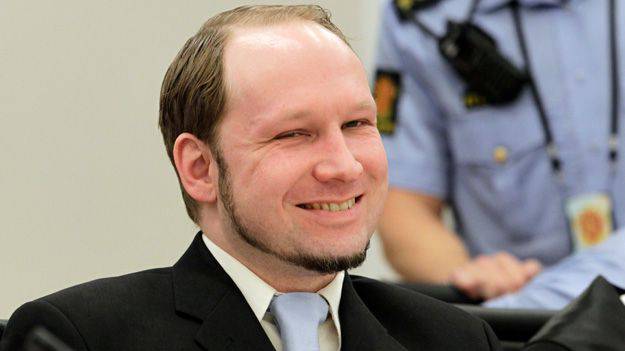
On the other hand, in Norway, as in other European countries, a significant part of African and Middle Eastern migrants tend to segregate, tends to self-isolation from the local population. In closed diasporas, there is a feeling of confrontation between one’s own and others, and the receiving society is perceived as a hostile “alien” world, despite the migration and social policies that are liberal and quite friendly to foreigners. The self-isolation of migrant diasporas, in turn, generates among them the desire to preserve national identity by any means, of course, that religious identity in this case acquires a very significant role. It is in the migrant environment that radical preachers are active, having great influence on migrant youth, not only the first, but also the second and even the third generation of migrants. After the massacre undertaken by Breivik, the Norwegian authorities turned to a gradual tightening of migration policy. Although this decision was contributed not so much by Breivik’s actions as by the analysis of sentiment in Norwegian society itself. According to sociological research data, more than half of Norwegians are in favor of restricting migration to the country. On the other hand, the system of social guarantees that Norway provides to migrants gradually becomes an overhead for the Norwegian budget, given that the number of migrants and refugees is only increasing, and the number of Norwegian taxpayers is not increasing. Therefore, it is likely that in Norway, sooner or later, there will be a noticeable change in the country's political course, which will inevitably affect the migration policy of the Norwegian state. Moreover, the migration policy of Norway, which is also focused on the multicultural paradigm, unlike Swedish multiculturalism, still provides for the assimilation by the migrants of the “Norwegian cultural code”. The thing is, do migrants agree to learn this cultural code and become culturally Norwegian? So far, the general situation in Norway indicates that a significant proportion of migrants do not seek integration into Norwegian society.
Denmark’s anti-immigration policy
Like Sweden and Norway, Denmark is one of the most socially and economically prosperous states in Europe. Until recently, Denmark was also practically a mono-ethnic country, however, in the second half of the twentieth century. began to attract foreign migrants. Like other Nordic countries, Denmark is experiencing a certain lack of highly qualified specialists associated with the aging of the Danish population. However, migrants arriving in the country are not able to cover this shortcoming. But foreigners occupy those low-prestigious and low-paid places where the vast majority of Danes do not agree to work. In particular, up to 80% of workers in the restaurant and hotel business, serving the population are foreign migrants. Over 30% of foreign migrants are employed in the field of cleaning, housing and communal services and consumer services. In principle, the dispersal of migrants by specific sectors of the economy in Denmark also differs little from the situation in Sweden, Norway, and other developed European countries.
But, unlike Sweden and Norway, Denmark has one of the strictest immigration control policies. To a certain extent, Denmark can be an example for its northern neighbors on how to build a migration policy in modern conditions. In the 9st century The migration policy of the Danish state was significantly tightened. Currently, a foreigner who is in Denmark can be permanently deported from the country for any offense, regardless of whether he has a residence permit or even real estate in the country. If a foreign migrant has lived in Denmark for less than nine years, then he can be deported from the country for any crime punishable by six months in prison. Migrants who have been in Denmark for more than XNUMX years can be expelled from the country for committing a serious crime against a person or in the field of drug trafficking. The tightening of the migration policy of the Danish state was the result of the problem of penetration into the country of migrants from African and Asian states, who have enormous differences in the cultural sphere from the bulk of the country's population. As in other Scandinavian countries, refugees from the warring countries of Asia and Africa, labor migrants, are sent to Denmark.
Only at the beginning of 2015 3 359 people sought refuge in Denmark, most of whom were people from Syria, as well as from Somalia, Iran and Afghanistan. However, unlike other EU countries, Denmark declared its unwillingness to join the policy of granting quotas for the stay of refugees from the Third World countries. Therefore, the Danish government has introduced new measures aimed at tightening migration policies and reducing the amount of benefits paid to refugees. Soon the reluctance of Denmark to place refugees on their territory was understood by the refugees themselves - currently the majority of refugees from Syria, Iraq, Afghanistan, Somalia and other countries are walking past Denmark, heading to Finland and Sweden. Sweden has agreed to provide a residence permit to all refugees from Syria, so numerous flows of refugees prefer to follow through Denmark, not registering in this country. The Danish parliamentarians also proposed a very interesting and controversial measure, received hostile by the European left-liberal public - the deputies of the country proposed to withdraw from the refugees valuable items worth more than 400 euros. According to Danish deputies, it is possible to partially cover the costs of maintaining centers for the accommodation of refugees, and MPs beat off criticism of opponents, claiming that indigenous Danes sell expensive things if they want to receive state social benefits. Another very effective measure to limit migration, undertaken by the Danish leadership - the requirement of mandatory knowledge of the Danish language from migrants who want to settle in the country. Since Denmark has not had colonies for a long time, and the majority of migrants enter countries that have never had anything to do with Denmark, this requirement is very difficult to fulfill. Therefore, undoubtedly, its effectiveness in terms of regulating the number of migrants in the Danish territory. If a person goes on to learn a new foreign language and passes the exam to own it, then he has really serious intentions and, most likely, he is focused on working in a new country of residence. An increasing support in Denmark is gained by the right-wing People’s Party, which advocates restricting migration and further tightening migration policies. On the basis of differences in views on migration policy, Danish leaders even entered into polemics with the leadership of neighboring Sweden, which is pursuing a liberal migration policy. When the Swedish politicians seriously criticized the position of the Danish authorities, the representative of the People’s Party, Pia Kjсrsgaard, spoke quite frankly: “if they (the Swedish authorities - approx. author) want to turn Stockholm, Gothenburg and Malmo into Scandinavian Beirut with clan wars, murder under the laws of revenge and gangs of tyrants, let them act. We can always close the bridge across the Öresund strait. ”
Finland pays huge benefits to refugees
Until the second half of the twentieth century. Finland, like most other Scandinavian countries, was not an attractive country for immigration. Moreover, the Finns themselves sought to leave their country, leaving in search of earnings in more developed countries - from neighboring Sweden to the United States and Canada. The first large group of foreign migrants who arrived in Finland in the second half of the twentieth century were 182 political refugees from Chile who left the country after the military coup committed by General Augusto Pinochet. Basically, these were representatives of the Chilean intelligentsia, who did not cause any trouble to the Finnish society and returned to their homeland after Pinochet left. The next wave of migration was already more exotic - at the beginning of the 1990's. Somalia's citizens who fled from the civil war that began after the overthrow of the regime of Mohammed Siad Barre began to enter Finland through Russia. Almost at the same time refugees from Yugoslavia rushed to Finland - Bosnians, Albanians, Serbs, Croats who also fled from the war. Further complication of the migration situation followed the entry of Finland into the European Union. First, labor migrants from Eastern European countries rushed to Finland. Secondly, from other EU countries, refugees began to enter Finland - Iraqis, Afghans, Syrians, Libyans, Eritreans. In the 2014 year, 3650 refugees entered Finland, mainly from Iraq, Somalia, Russia and Afghanistan. During the first five months of 2015, 1361 refugees entered the country, mainly from Somalia (446) and Iraq (454). Naturally, the emergence of several thousand refugees, culturally very different from the Finnish population, led to the strengthening of nationalist sentiment in the country. According to opinion polls, 52% of Finns believe that the arrival of immigrants in the country should be limited. The behavior of the migrants themselves contributes to the radicalization of the mood of the Finnish population towards migrants. So, in November 2015, two migrants from Afghanistan raped a Finnish schoolgirl, which caused a flurry of public criticism of the migration policy of the Finnish state. Like Sweden, Finland is currently pursuing a very liberal refugee reception policy. Thus, a refugee arriving in Finland receives an allowance of 2 thousand euros per person per month. Given that the Finnish unemployed person receives an allowance in the amount of 800 euros. This factor also causes outrage of the Finnish population.
Thus, we see that the migration situation in the Scandinavian countries contributes to the growth of social and political tensions. The most effective model of migration policy management is demonstrated by Denmark, which has resorted to strict control over migration, the most vulnerable positions are in Sweden, Finland and Norway. The solution to the migration problem in these countries largely depends on what political forces will come to power in the near future and how they will shape the political course of states.
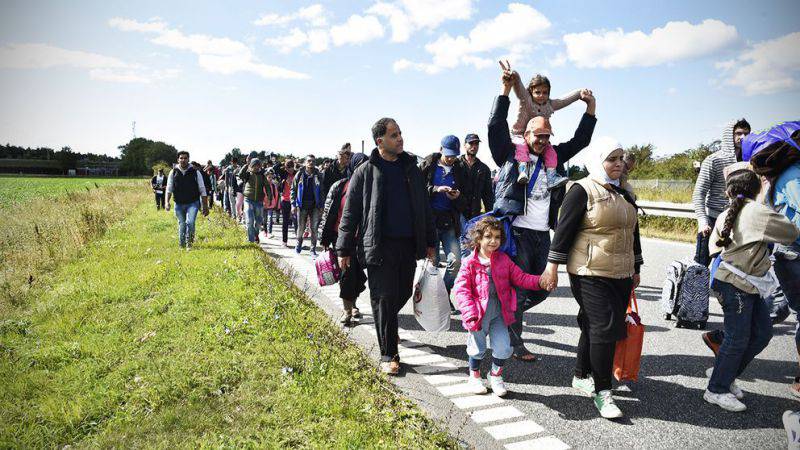
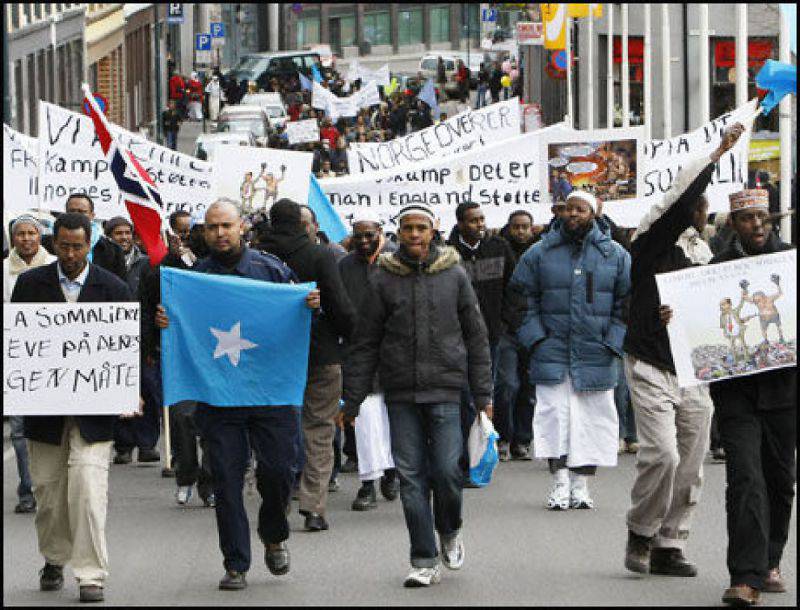
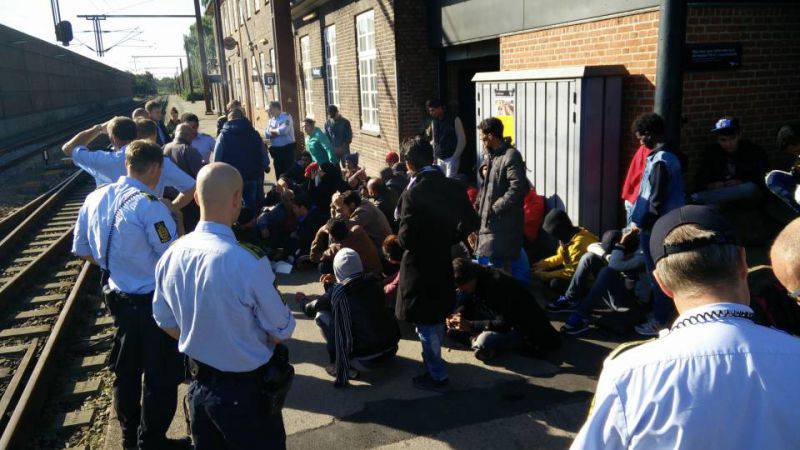
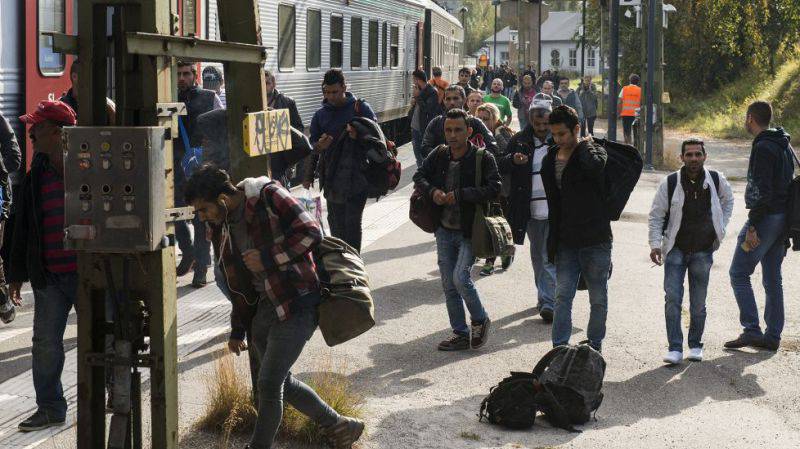
Information